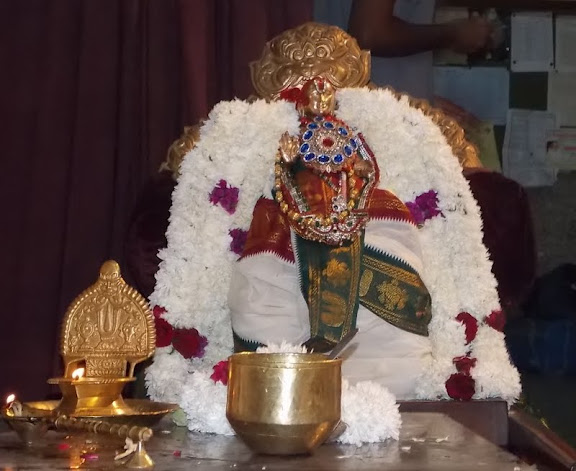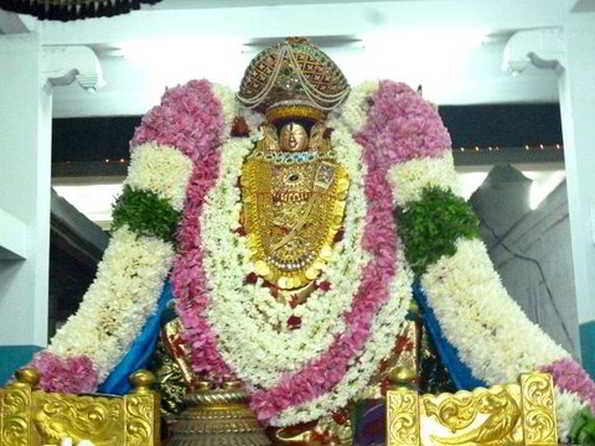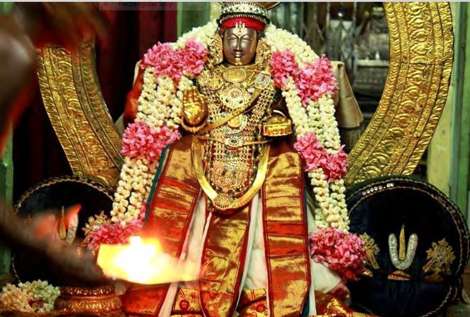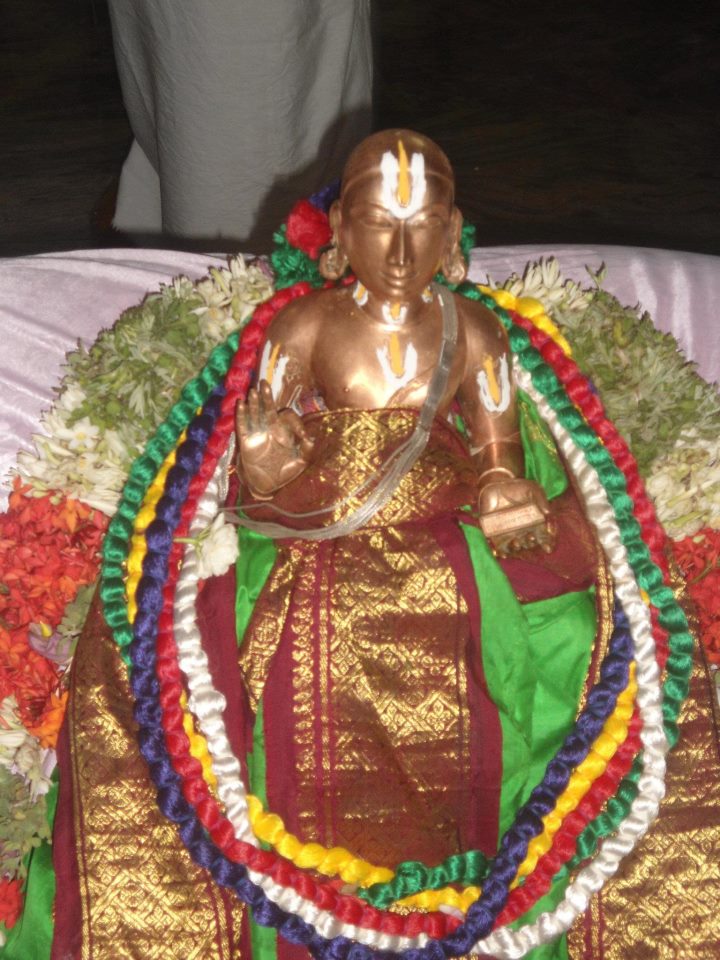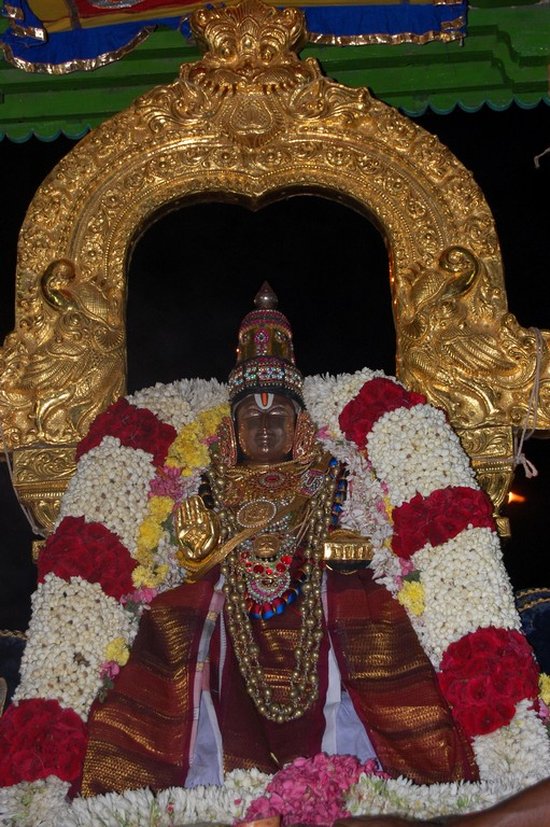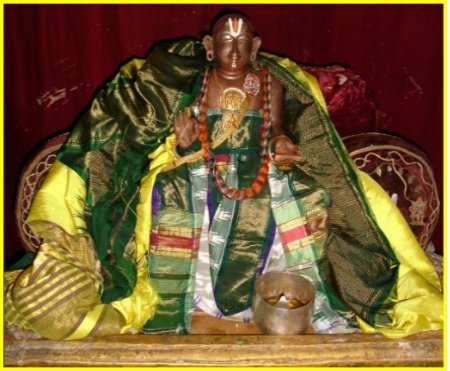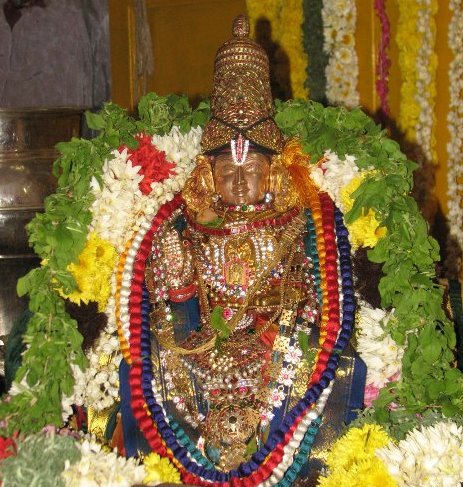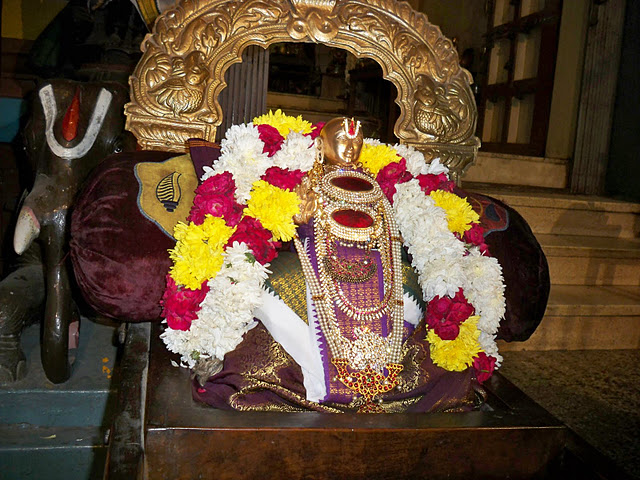Sloka #1001
1001. ithirangaDhurINapAdhukE! thvam
sthuthilakshaNa sahasrashO vimrushta:
saPhalam mama janma thAvadhEthath
yadhihAshAsyamatha: param kimEthath
Meaning (translated by Sri. U.Ve. V.N. Vedanta Desikan)
Oh Ranganatha Paaduka! I have thought of You a thousand times** in the pretext of composing this work. Even that makes my life fully lived and fully rewarded. Then what is there for me to seek to secure inthis world?
**Sahasra means the number 1000 or a very large number (many thousands).
Special Notes from Sri. U.Ve. V. Sadagopan
1) UtthamUr Swamy’s anubhavam: This is the first of the eight slOkams dealing with the completed thousand slOkams (kruthamAna Sahasram). The first slOkam recognizes the BhAgyam accrued to the poet, who expresses his gratitude for completion of the 1000 slOkams without vignams. Swamy Desikan says in this context : ” Oh PaadhukE ! Through the excuse of composing a eulogy to You, You have been analyzed by me in thousand ways. My life has become more fruitful through that effort. After this blessing, there is nothing that I need or want.
2) SrImath Andavan’s anubhavam: Oh PaadhukE! Through Your anugraham, I have now completed the Sahasram about You that You commanded me to create. During the course of this effort, I enjoyed addressing You as “PaadhukE, PaadhAvani, PadhAvani, PadhathrANE, PadharakshE, PaadharakshE, CharaNa ThrAyiNee, Hari PaadhukE, Souri PaadhukE! Raaghava PaadhukE , Rangapathy PaadhukE, MaNi PaadhukE, Kaanchana PaadhukE, Rathna PaadhukE ” and with other endearing names. I uttered them singly and with Your Lord’s names one thousand times. In addiiton to that, I analyzed Your Svaroopa, Roopa, guNa vibhUthis and praised You to my heart’s content. After recieving that ParamAnugraham, my janmA , which was fruitless (nishphalam) until then transformed itself to one full of fruits (Saphalam). It ended up with myself being freed from future births and deaths. There are no pradhAna PurushArTam beyond that.
3) Oh Paadhukai of the Lord who rules Srirangam as His Nruttha rangam !(hE RangadhureeNa PaadhukE!) You have been now praised thousand times using the ruse of attempting Your Sthuthi (Thvam sthuthi lakshyENa Sahasrasa: vimrushtA). Therefore, I consider that this janmam of mine has attained its total fulfilment (atha: mama yEthath janma: saphalam thAvath ithi manyE ). There is nothing in this janmaa that I need to pray for as a desired boon since I have alrady been blessed with the BhAgyam of creating this sthuthi about You (Yath yEthath iha aasaasyam atha: param kim asthi ? )…(V.S)
1001. இதி ரங்கதுரீண பாதுகே த்வம்
ஸ்துதி லக்ஷ்யேண ஸஹஸ்ரசோ விம்ருஷ்டா
ஸபலம் மம ஜந்ம தாவத் ஏதத்
யதிஹாசாஸ்யம் அத: பரம் கிம் ஏதத்
பொருள் – ஸ்ரீரங்கராஜனின் பாதுகையே! இப்படியாக உன்னைத் துதிப்பது என்ற ஸ்தோத்ரம் ஒன்றைச் சாக்காக வைத்துக்கொண்டு, என்னால் ஆயிரக்கணக்கில் நீ சிந்திக்கப்பட்டாய். இதன் மூலமாக எனது பிறவியானது மிகுந்த ப்ரயோஜனம் மிக்கதாகி விட்டது. இதற்கு மேல் இந்த உலகத்தில் நான் பெற வேண்டியதும், ப்ரார்த்தனை செய்யவேண்டியதும் வேறு என்ன உள்ளது?
Sloka #1002
1002. mAtha:! svarUpamiva rangapathErniviShtam
vAchAmasImani padhAvani! vaIBhavam thE
mOhAdhaBhiShtuthavathO mama mandhabuDdhE-
rbAlasya sAhasamidham dhayayA sahEThA:
Meaning (translated by Sri. U.Ve. V.N. Vedanta Desikan)
Oh Mother Paaduka! The Lord’s nature is incomprehensible and far beyond our measurement as the greatness of Yourself. Nevertheless, I dared to embark on this venturesome job difficult for an immature debutant. May You forgive me for my ignorance and entry into a dangerous territory!
Special Notes from Sri. U.Ve. V. Sadagopan
1) UtthamUr Swamy’s anubhavam: Oh Mother ! Your glories like RanganAthA’s attributes are beyond description. Through my ignorance as a young person and dull wit, I attempted to sing your glories and lengthened this eulogy. It was a bold and eugotistic act. Please forgive me for this through Your compassion.
2) SrImath Andavan’s anubhavam: After declaring that he had composed the sahasram on the exalted Paadhukais and how grateful he was, Swamy Desikan was overcome with the fear that he might have overstated his case as a successful poet. He asks for his rash statement and requests Paadhukais to forgive his daring statement. He says: ” Oh PaadhukE Your infinite attributes (Svaroopa, Roopa, GuNa, VibhUthis) like that of Your Lord are beyond one’s power to describe satisfactorily. Just like children engaging in a daring act without assessing their capabilities, I have also dared to compose thousand verses about Your Vaibhavam and have declared that I have completed them successfully. This is a Saahasa Kaaryam. It is an apachAram to conclude that I ahve captured YOur limitless glories in the short span of thousand verses. Please forgive adiyEn’s MahApachAram out of Your sense of Vaathsalyam for Your child and treat my apachAram as a guNam and bless me!
3) Oh Mother PaadhukE ! LIke YOur Lord , Your attributes are beyond the ken of us (RangapathE : Svaroopamiva tava svaroopam Tava, Roopam, GuNam vaachAm aseemani nivishtam). They are beyond the reach of speech. I am like a dull witted one and an ignorant child (Mandha Buddhi:, Baalan), which enagages in a daring act without thought (Saahasa kaarya prayuktham). I dared to engage in an effort to confine Your limitless vaibhavam into a mere thousand slOkams (tE vaibhavam mOhAth abhishtuthavatha: ). Oh Mother PaadhukE ! YOu must forgive this daring act of follishness out of Your DayA for me (Baalasya mama saahasam idham dayayA sahETA: )….(V.S).
1002. மாத: ஸ்வரூபம் இவ ரங்கபதே: நிவிஷ்டம்
வாசாம் ஆஸீமநி பதாவநி வைபவம் தே
மோஹாத் அபிஷ்டுதவத: மம மந்த புத்தே:
பாலஸ்ய ஸாஹஸம் இதம் தயா ஸஹேதா:
பொருள் – ஸ்ரீரங்கநாதனின் பாதுகைத்தாயே! ஸ்ரீரங்கநாதனின் ஸ்வரூபத்தைக் காட்டிலும், வாக்கின் மூலம் எட்டாத பெருமை கொண்டவளாக நீ உள்ளாய். இப்படிப்பட்ட உனது மேன்மைகளை, தாழ்வான அறிவு கொண்ட சிறுவனாகிய நான், எனது அறியாமை காரணமாகத் துதிக்க முற்பட்டேன். உனது மேன்மையை ஆயிரம் ச்லோகத்தின் மூலம் அளவிட்டுக் கூற முயன்ற எனது அறியாமையைப் பொறுத்துக் கொண்டு, எனது ஸாஹஸத்தை உனது தயை மூலம் மன்னிப்பாயாக.
Sloka #1003
1003. yE nAma BhakthiniyathA: kavayO madhanyE
mAtha: sthuvanthi maDhusUdhanapAdhukE thvAm
lapsyE guNAmshavinivEshithamAnasAnAm
thEShAmaham sabahumAnavilOkithAni
Meaning (translated by Sri. U.Ve. V.N. Vedanta Desikan)
Oh Lord’s Paaduka! Many others may compose similar works on You, prompted by devotion. They will be conscious of the obstacles in the path and they will, therefore not direct their eyes except on the virtues of this work of mine.
Special Notes from Sri. U.Ve. V. Sadagopan
1) UtthamUr Swamy’s anubhavam : Oh Mother! Poets , who are devotees of Your Lord will concentrate on my descriptions about Your auspicious qualities and will compose their own poems praising You. They will read my sthOthram on You with affection . Being devotees of Your Lord, they make me fulfilled in my efforts through their adoring approvals.
2) SrImath Andavan’s anubhavam: The PaadhukA responds to the prayer to be forgiven and says: ” Alright, I forgive You out of my affection for You. What about the righteous ones? Wll they accept Your daring act? Swamy Desikan answers: “Oh Mother PaadhukE! In the matters of praising You, the success or failure to adequately capture Your multitudes of GuNams is neither due to their sakthi or asakthi. It is their prEmai (love) for You that propels the righteous ones. Those revered righteous ones will therefore not look at my deficencies but will examine whether my effort is linked to prEmai for You. They want to know whether my sthuthi is a PrEma garbha sthuthi or not. If they conclude that adiyEn’s sthuthi arose from Bhakthi paravasam, then they will overlook the aspects of dhOsham and will be pleased with my efforts. Since my endeavours are driven by my athyantha prEmai for You, I feel confident that the righteous ones will accept it and overlook any blemishes.
3) Oh Mother PaadhukE ! The other poets (madhanyE yEnAma Kavaya: ) propelled by their deep devotion for You (Bhakthi niyathA: ) engage in praising You through their SrI Sookthis (ThvAm Sthuvanthi). Those righteous ones are going to react to my Sahasram with favor and cast their benovolent glances on me since they would recognize that my efforts like theirs are driven by Bhakthi to You (GuNAmsa vinivEsitha mAnasAnAm tEshAm sabahumAna vilOkithAni aham labhyasE )….(V.S).
1003. யே நாம பக்திநியதா: கவயோ மதந்யே
மாத: ஸ்துவந்தி மதுஸூதந பாதுகே த்வம்
லப்ஸ்யே குணாம்ச விநிவேசித மாநஸாநாம்
தேஷாம் அஹம் ஸபஹுமாந விலோகிதாநி
பொருள் – ஸ்ரீரங்கராஜனின் பாதுகையே! என் தாயே! அம்மா! என்னைக் காட்டிலும் உன்னிடம் பக்தி அதிகமாக உள்ள கவிஞர்கள் உன்னைத் துதிக்கக்கூடும். அவர்கள் உனது வாத்ஸல்யம் போன்ற குணங்களில் தங்கள் மனதை நிலை நிறுத்திப் புகழ்வார்கள். அவர்களின் கடாக்ஷம் நிறைந்த பார்வையை நான் அடையப் போகிறேன்.
Sloka #1004
1004. sanGharShayanthi hrudhayAnyasathAm guNAmshE
santhasthu santhamapi na praThayanthi dhOShAm
thadhranganAThacharaNAvani! thE sthuthInA-
mEkA param sadhasathOriha sAkshiNI thvam
Meaning (translated by Sri. U.Ve. V.N. Vedanta Desikan)
Oh Ranganatha Paaduka! The bad people in our society will close their eyes to the virtues but will harbour jealousy. The good ones, on the other hand, will keep silent over the defects. As such, You are the only authority fit to judge the merits and demerits of this work.
Special Notes from Sri. U.Ve. V. Sadagopan
1) UtthamUr Swamy’s anubhavam: Oh RanganAtha PaadhukE! The evil ones try to point out good verses as having defects. The righteous ones do not emphasize the defects and elect to praise the good aspects of my composition on You. Be that as it may, You are the ultimate judge of good and bad in my verses. I am contented as long as You appreciate my special efforts to praise You through this composition.
2) Srimath Andavan’s anubhavam: The Paadhukai listens to Swamy Desikan’s response on the righteous ones (GuNa PakshapAthis) and asks Swamy Desikan to explain who will judge the opinions of the righteous about his Kaavyam. Swamy DEsikan responds: ” Oh Bhagavath anuroopa sahacharee PaadhukE! You are indeed the best judge of such disputes and differences of opinions. Like Your Lord! Where can I go to have adjudication on the good and bad qualities of my Sahasram on You? The Saadhus are GuNa PakshapAthis and hence will always speak about the good aspects and play down any blemishes. The asaadhus (dhushtans) have the inherent svabhAvam only to find faults. The GUNa bhAgam will never get their attention. They will condemn my efforts as worthless and insignificant. If we ask the busy people engaged in chasing worldly things, they wont have any time for studying the Sahsram. These would be positions of the anukoolar, prathikoolar and the anubhayar as the three categories of people in this world. What can I do? Who can I ask for an impartial judgement /review?
3) Oh Rangaraja CharaNAvani ! Those aasura prakruthis will point out all kinds of blemishes in my eulogy about You out of their envy (asathAm hrudhayAni guNAmsE sangharshayanthy). The dhaiva prakruthis will not publicize any blemishes out of their goodness (Santhasthu dhOshAm santhamapi na praTayanthi) . They explain the dhOshams and pass it of as GuNams. Therefore inthe matter of determination of blemishes or good aspects, YOu alone are the most dependable witness (Tath tE sthutheenAm iha sadhasathO: Thvam param saakshiNee)…(V.S).
1004. ஸங்கர்ஷயந்தி ஹ்ருதயாநி அஸதாம் குணாம்சே
ஸந்தஸ்து ஸந்தமபி ந ப்ரதயந்தி தோஷம்
தத் ரங்கநாத சரணாவநி தே ஸ்துதீநாம்
ஏகா பரம் ஸதஸதோ: இஹ ஸாக்ஷிணீ த்வம்
பொருள் – ஸ்ரீரங்கநாதனின் பாதுகையே! கவிகள் அல்லாதவர்களில் அஸத்துக்கள் எனப்படும் மனிதர்களின் இதயங்கள், நல்ல விஷயங்களில் உள்ள நன்மைகளிலும் குற்றமே காண முற்பட்டு, இதனால் பொறாமையும் கொள்ளும். ஸத்துக்கள் என்பவர்கள் குற்றம் இருந்தாலும் அவற்றை வெளியிடமாட்டார்கள். ஆகவே இந்த நூலில் உள்ள குணங்களுக்கும், தோஷங்களுக்கும் நீயே மத்யஸ்தமாக நின்று ஆராயவேண்டும்.
Sloka #1005
1005. itTham thvamEva nijakELivashAdhakArShi-
rikshvAkunAThapadhapankajayOrananyA
svIyam padhAvani! mayA sumahaccharithram
sIthEva dhEvi! sahajEna kavIshvarENa
Meaning (translated by Sri. U.Ve. V.N. Vedanta Desikan)
Oh Paaduka Devi! You, who never attached any importance to anything other than the two Lotus-Feet of Raghava (of the famous Ikshvaku dynasty) caused me to produce this poem, in Your praise-even as Sita got Ramayana written by Sage Valmiki-both, as mere sport.
Special Notes from Sri. U.Ve. V. Sadagopan
1)UtthamUr Swamy’s anubhavam: Oh PaadhukE ! Being under Your spell, SitA Devi got closely attached to Your Lord’s feet and through Her brother VaalmIki had the mighty ithihAsam knowna s SrImath aamAyaNam completed. In a similar vein, You have playfully made me compose this huge eulogy about You “. ( SitA PirAtti was the daughter of BhUmi DEvi. Sage VaalmIki was born in the house of white ants that grew from the earth. Hence, he is also a child of BhUmi Devi and therefore a brother of SitA Devi. Sage Valmiki did penance in that underground house and became a supreme poet).
2) SrImath Andavan’s anubhavam : Oh PaadhukE! There can not be any blemishes in my eulogy of You! I was slightly befuddled and reacted as though that I had composed this Kaavyam. What a delusion on my part? The subject of this sthOthram is none other than Yourself and You are also the author of this sthOthram. Just as SitA PirAtti energized Sage VaalmIki to compose the ithihAsam celebrating Her, You as Her RoopAntharam (other form) have blessed me with the power of speech and Jn~Anam to be ” the author” of this Kaavyam. These 1000 slOkams were created by You through me as a leelai to help the jeevans to overcome their samsAric tApams. In view of Your authorship of this sthuthi, there is no room for any blemishes in this kaavyam bearing Your name ( RanganAtha PaadhukA Sahasram).
3) Oh PaadhukA DEvi ! You who has taken sole refuge at the lotus feet of IshvAku Naathan (Sri RanganAthan), have created this lofty PaadhukA Sahsram as a playful act through me (IshvAku NaaTa padha pankajayO: ananyA ThvamEva mayA sveeyam sumahath charithram nija kELi vasAth akArshee: ). This act of Yours is like SithA DEvi’s, who has no recourse except IshvAku NaaTan’s lotus feet had the ithihAsam about Her ( SrImath RaamAyaNam) created by Her brother , Sage VaalmIki as a sport ( IshvAku NaaTa Padha PankajayO; ananyA SeethA sahajEna kaveesvarENa akArshee: iva)….(V.S).
1005. இத்தம் த்வம் ஏவ நிஜகேளி வசாத் அகார்ஷீ:
இக்ஷ்வாகு நாதபத பங்கஜயோ: அநந்யா
ஸ்வீயம் பதாவநி மயா ஸுமஹத் சரித்ரம்
ஸீதேவ தேவி ஸஹஜேந கவீச்வரேண
பொருள் – ஸ்ரீரங்கநாதனின் பாதுகாதேவியே! இக்ஷ்வாகு குலத்தின் நாயகனான இராமனின் திருவடிகளைத் தவிர வேறு எதனையும் நாடாத சீதை, தனது உடன் பிறந்தவரான வால்மீகி முனிவரைக் கொண்டு, தனது மேன்மைகள் வெளிப்படும் இராமாயணத்தைச் செய்வித்தாள். நீயும் அவள் போலே, ஸ்ரீரங்கநாதனின் திருவடிகளைப் பிரியாதவளாக உள்ளாய். ஆக நீயும் அவள் போன்று என்னைக் கொண்டு, உன்னுடைய மிகப் பெரிய சரிதத்தை ஏற்படுத்திக் கொண்டாய்.
Sloka #1006
1006. pruThukavadhanashanKhasparshanIthyA kadhAchith
shirasi vinihithAyA: svEna BhUBnA thavaIva
sthuthiriyamupajAthA manmuKhEnEthyaDhIyu:
paricharaNaparAsthE pAdhukEpAsthadhOShA:
Meaning (translated by Sri. U.Ve. V.N. Vedanta Desikan)
Reliable critics are those who are Your pious servants. They will readily accept my explanation as regards the origin of this work. Just as the Lord’s touching the cheek of Dhruva, a young child, was adequate to make him compose verses of praise, the Lord had His Paadukas sit on my head. That was enough!
Special Notes from Sri. U.Ve. V. Sadagopan
1) UtthamUr Swamy’s anubhavam:Oh PaadhukE ! Lord NaarAyaNa touched the cheek of child DhruvA, who was in deep meditation about Him. Dhruvan got empowered by that divine contact to compose a brilliant eulogy on Your Lord, even if he was a mere untutored child. Similarly, this PaadhukA Sahasram of mine originated from the mere resting of You on my head. This composition is therefore a direct result of Your glory and power. This is how the righteous people devoid of attachment (raagam ) and malice (asooyA ) think about how it came about. That is the way future generations should think.
2) SrImath Andavan’s anubhavam: Oh PaadhukE ! You may ask how people can believe my attribution of authorship of this sthOthram to You. adiyEn will give an answer to that query in a credible manner with praNAmams. There are many eye witnesses to the incident, when ArchakAs as the representatives of Lord RanganAthA placed You on my head for an extended period of time. It is well accepted that Lord during His archAvathAram reveals His commands through His archakAs (archaka mukhEna niyamanam). Your Lord seems to have commanded me to acquire dhivya Jn~Anam and Vaak to eulogize You through You like He blessed once before child Dhruvan to have the Jn~Anam to eulogize Him. At that time, Your Lord blessed Dhruvan with dhivya Jn~Anam by touching the cheek of that child with His Paanchajanyam. Similarly, Your resting on my head due to YOur Lord’s comment is the hethu for the birth of this eulogy about You and composed by You.
3) Oh PaadhukE ! Your resting on my head resulted in the visEsha Jn~Anam just as Paanchajanya sparsam led to the blossoming of dhivya Jn~Anam for the child Dhruvan ( PruTuka vadhana Sanka sparsa reethyA iyam sthuthi: upajAthA ithi ). At the time of Your Lord approving the creation of this sthuthi about You, He had commanded His archakAs to place You on my head so that Your mahimai can enter into me to construct this poem about You with me as a mere instrument to execute His command (kadhAchith sirasi vinihithAyA: Tava svEna bhUmnA yEva manmukhEna iyam sthuthi: upajAthA ). This is how the great ones engaged in Kaimkaryams to You and known for their freedom from any kind of blemishes would comprehend the origin of this Kaavyam ( apAstha dhOshA: ParicharaNaparA : Santha: svEna bhUmnA yEva manmukhEna upajAtha ithi adheeyu: )…(V.S).
1006. ப்ருதுக வதந சங்கஸ்பர்ச நீத்யா கதாசித்
சிரஸி விநிஹிதாயா: ஸ்வேந பூம்நா தவைவ
ஸ்துதி: இயம் உபஜாதா மந்முகேந இதி அதீயு:
பரிசரணபரா: தே பாதுகே அபாஸ்த தோஷா:
பொருள் – ஸ்ரீரங்கநாதனின் பாதுகையே! உனது கைங்கர்யத்தில் மட்டுமே ஈடுபட்டு நிற்கும் உத்தமர்கள் என்ன நினைப்பார்கள் தெரியுமா – துருவன் முகத்தில் எம்பெருமானின் பாஞ்சஜன்யம் என்ற சங்கின் தொடர்பு ஏற்பட்டவுடன், ஞானம் உண்டானது போன்று, எனது தலையில் வைக்கப்பட்ட உனது மேன்மையால் இந்த ஸ்தோத்ரம் என் மூலமாக உண்டாயிற்று என எண்ணுவார்கள்.
விளக்கம் – எம்பெருமானைக் குறித்து துருவன் கடுமையான தவம் செய்தான். அப்போது அவன் முன்பாக எம்பெருமான் வந்து நின்றான். ஆனால் குழந்தையான துருவனுக்கு எம்பெருமானை எப்படித் துதிப்பது என்று தெரியவில்லை. அப்போது எம்பெருமான் தனது சங்கின் மூலம் துருவனின் கன்னத்தைத் தொட, அவனுக்கு ஞானம் உண்டானது. இது போன்று ஸ்ரீரங்கநாதனுடைய பாதுகையின் ஸ்பர்சம் தன் மீது பட்டதால், இந்தத் துதி ஏற்பட்டதாகக் கூறுகிறார்.
Sloka #1007
1007. yadhi sPhIthA Bhakthi: praNayamuKhavANIparipaNam
padhathrANasthOthram hrudhi biBhrutha rangakshithiBhrutha:
nirunmAdhO yadhvA niravaDhisuDhAnirJharamuchO
vachOBhangIrEthA na kaThamanurunDhE sahrudhaya:
Meaning (translated by Sri. U.Ve. V.N. Vedanta Desikan)
Oh People! If you have pure devotion, learn by rote, this hymn on Paaduka. Remember this would serve, as investment for high-standard literary classics, which You could Yourselves be able to put forth. True connoisseurs of literature-provided they are not out of their senses-would have to receive this work with great enthusiasm. How can they afford to miss the fine aspects of literary merit herein?
Special Notes from Sri. U.Ve. V. Sadagopan
1) UtthamUr Swamy’s anubhavam : Oh People! If Your minds are full of devotion to the Lord, You will cherish in Your hearts the PaadhukA sahasram verses, which are dominated by the feeling of affection. They give the power to compose sweet poems. Hence, recite the verses of PaadhukA Sahasram. For those free of aggression, reciting the thousand verses of PaadhukA Sahasram, there is no need to remind them to remember these verses as those, which help to compose divine poems. They will do it on their own, without any prompting.
2) SrImath Andavan’s anubhavam: Oh People of the world! May I share with You a subject , which is very beneficial (Parama Hitham ) to you all? Let me explain to You the significance of the SrI RanganAtha PadhukA Sahasram. It has identical potency to Vedams, which is Parama prApyam and Parama PrApakam. Hence the recitation of SrI RanganAtha PaadhukA Sahasram praising indirectly the Veda PrathipAdhyan, SrI RanganAthan will be Parama Hitham, Parama Balam and Parama KshEmam for You all. The intrinsic greatness of the Lord’s Paadhukais will grow Your bhakthi for the divine Paadhukais and lead to Parama srEyas and prEyas. Recitation of the PaadhukA sahasra slOkams and comprehension of the deep tathvArTams embedded in them will be like the partaking of life-giving amrutham. May You all enjoy the parama sukham that is being enjoyed by me through the composition of this Kaavyam with the anugraham of the Lord’s Paadhukais and enjoy all aihika and aamushmika sukhams all the way upto Moksham!
3) Oh People of the World (JanA: )! If You have paripoorNa Bhakthi for the Lord’s Padhukais, Please adorn the PadhukA Sahasram in Your hearts, which has the basis in the apourushEya Vedams ( hE JanA:! spheetha bhakthi: yadhi, praNaya mukha VaaNee paripaNam padha thrANa sthOthram hrudhi Bhibrutha ). Even if You do not have such full devotion for the Paadhukais, the sweet naadham of the sthuthi and the delectable taste arising from the recitation of them would lead them to get these slOkmas by heart. Those with subtle intellect would be overwhelmed by the unique artha svArasyams embedded in these slOkams and experience them like the flood of nectar flowing over them. Hence how can the one with saamAnya buddhi (nirunmAdhA: ) as well as those with discriminating intellect (rasa Jn~Ana sahrudhaya: ) resist their drenching in the never-ending flood of amrutham flowing in the form of delectable sound (spheethA bhakthi: yadhvaa nirunmAdhA:, sahrudhaya: niravadhi sudhA nirjara mucha: yEthA: vachObhangee: kaTam naanurundhE ? )…(V.S).
1007. யதி ஸ்பீதா பக்தி: ப்ரணயமுக வாணீ பரிபணம்
பதத்ராண ஸ்தோத்ரம் ஹ்ருதி பிப்ருத ரங்கக்ஷிதி ப்ருத:
நிருந்மாதோ யத்வா நிரவதி ஸுதா நிர்ஜ்ஜரமுசோ
வசோபங்கீ: ஏதா கதம் அநுருந்தே ஸஹ்ருதய:
பொருள் – மக்களே! உங்களுக்கு ஸ்ரீரங்கநாதனின் பாதுகைகள் மீது பக்தி ஏற்பட்டால், வேதங்கள் மூலம் அறித்தக்கதான பாதுகையை வெளிப்படுத்தும்படியாக உள்ள இந்த ஸ்ரீரங்கநாத பாதுகா ஸஹஸ்ர ஸ்தோத்ரத்தை, உங்கள் மனதில் எப்போதும் நிலையாக வைத்து இருப்பீர்களாக. அப்படிப்பட்ட பக்தி உங்களிடம் இல்லை என்றாலும், புத்தி தடுமாற்றம் அடையாத ஒருவன், நல்ல விஷயத்தை அறியவல்ல ஒருவன், அளவற்ற சொல் அமிர்தம் அருவி போன்று கொட்டுகின்ற இந்த ஸ்தோத்ரத்தை எப்படி ஆதரிக்காமல் இருப்பான்?
Sloka #1008
1008. Jayathi yathirAjasUkthi: jayathi mukundhasya pAdhukAyugaLI
thadhuBhayaDhanAsthrivEdhImavanDhyayanthO jayanthi Bhuvi santha:
Meaning (translated by Sri. U.Ve. V.N. Vedanta Desikan)
The great works like Sri Bhashyam of Ramanuja shine forth excellently. The Paaduka-Duet of Ranganatha, who is the Moksha-grantor shines forth in great luster. (The works of Azhvar, who represents the Paaduka, hold forth in great glee). Sadhus, who cherish as their wealth the two above, who also make the Vedic mandates really authoritative, they following the Vedas implicitly shine in the world with great gusto!
Special Notes from Sri. U.Ve. V. Sadagopan
Jayathi Yathiraaja sookthi: Jayathi Mukundhasya pAdhukA yugaLee
Tadhubhaya dhanAs-thrivedheem avandhyayanthO jayanthi bhuvi Santha:
1) UtthamUr Swamy’s anubhavam: The commentary on Brahma SoothrAs known as SrI BhAshyam will thrive in this world . The PaadhukAs of MukundA , who confers the boon of Moksham will last forever here in their glory. Those righteous people, who carry SrI BhAshyam and the Lord’s PaadhukAs on their heads as their entire wealth will follow the principles established by the VedAs without fail and will be celebrated in the world for their possession of true knowledge and exemplary conduct.
2) SrImath Andavan’s anubhavam: This is the last of the SrI RanganAtha PadhukA Sahasra slOkmas. Swamy Desikan is grateful for the BhAgyam of composing this unique Kaavyam through the commands (niyamanams) of Bhagavaan, His Paadhukais and the SadAchAryAs, who follow in that paramparai. He states that the Lord’s Paadhukais of immeasuarable vaibhavam made it easy for him to comprehend the true meanings of Tatthva, Hitha PurushArTams and used him as an instrument to propagate the Tathtva-Hitha-PurushArTams for the benefit of the world through this Kaavyam. He says that he became uplifted (dhanyan) to recieve this special honor. He points out that the VedAs felt relieved from the fear of misintrepretation by the kumathis. He exclaimed loud the victory won by the Saasthrams and the Divine Lord over the Paramathms with untenable doctrines , which are against acceptable Sath-pramANams like Prathyaksham, anumAnam and sabdham. Swamy Desikan exults over the parama paavana anugraham of Paadhukais of the Lord, which established through this Kaavyam the Supermacy of SrIman NaarAyaNan ( ParadEvathA PaaramArtyam) and the SarIrAthma BhAva Sambhandham as established by AchArya RaamAnuja and the poorvAchAryAs. Swamy Desikan hails the glories of SrI Sookthis of AchAryAs, which show us the way away from SamsAric sufferings and put us on the path for SrI Vaikuntam to participate in the nithya, niravadhya (blemishless ) Kaimkaryam to the Dhivya Dampathis as Muktha Jeevans following the upAya anushtAnam of Prapatthi or Bhakthi yogam. Swamy hails the attainment of Bhagavath Kaimkarya MahA Iswaryam resulting from the anugraham of the Lord’s Paadhukais (Swamy NammAzhwAr). He points out that the dhivya PaadhukAs of Lord RanganAtha reveal the Lord’s lotus feet as the MokshOpAyam since Lord can not reject those, who seek His sacred feet as their refuge (anathilanganeeyam hi CharaNa grahaNam ). He instructs us that the Paadhukais (SadAchAryAs ) create the sambhandham between the Lord and the Mumukshus (those who desire Moksha Sukham). Swamy performs thus MangaLAsAsanam for this Phala saadhana SrI Sookthi by hailing (performing PallANDu) to the Dhivya Sookthis of PoorvAchAryAs like AchArya RaamAnuja, who blessed us with eye openers like SrI BhAshyam, GeethA BhAshyam and several other gems. He salutes those great ones (Santha: ), who benefit from AchAryA SrI Sookthis and reveal the greatness of such powerful and auspicious SrI Sookthis to their sishya Paramparais. Thus Swamy Desikan concludes the MahA Kaavyam about the glories of SrI RanganAtha PaadhukAs with the same word used to commence this Kaavyam (Santha: ) in the traditional style of AnthAdhi (back to beginning format).
3) The Sri Sookthis of YathirAjar (AchArya RaamAnujA) are victorious! (Yathiraja Sookthi: Jayathi). They establish that these Veda-BhAhya mathams (which are outside the fold of Vedams) are aprAmANikam (not based on accepted PramANams). The Divine PaadhukAs of the Moksham-granting Mukundhan, the Lord of MahA Lakshmi, are victorious ! (Jayathi Mukundhasya PaadhukA YugaLee). He is the Sarva-karma samArAdhyan (worshipped by all KarmAs) and Sarva–samAsrayaNeeyan (sought as protection by every one); Mumukshus seek His sacred feet as the loftiest object of protection (Parama PurushArTam/Ultimate Goal of life for the chEthanam). One should seek Mukundhan and His Paadhukais in Sath–sishya Kramam ( right kind of order as a disciiple) and live in an auspicious state. The twins (AchArya SrI Sookthis and the Lord united with the Padhukais (Tadhubhaya) are the wealth (Dhanaa: ) of the enlightened ones (Santha: ), who never discard or belittle the Vedams divided into the three categories of Rg, Yajur and Saamam (Tadhubhaya dhanA: thrivEdheem avandhyayantha: Santha: Jayanthi) . These enlightened ones are victorious (Santha: Jayanthi) and they instruct the seekers about the true meanings of Vedhams and save them from falling into the net of those propagate false mathams, which are outside the purview of pramANms based on Vedhams. These Saadhus (Santha: ) shine as bright lamps to light the way of those who seek the right path through their correct upadEsams on the nature of the Supreme Being and His Saasthrams. They remain victorious right here on this earth. Swamy Desikan uses the word “Jayathi” to indicate his state of joy over the Jaya SrI of Bhagavaan, His SadAchArya Paramparai and the SrI Sookthis of those SadAchAryAs . This final slOkam is considered by commentators as the essence of all upadEsams to one seeking Moksham (SarvArTa Sangraham). For the sake of emphasis following the anthAdhi style, Swamy Desikan starts with the two words, “Jayanthi Santha:” in the first slOkam and concludes with the very same two words, “Jayanthi Santha:”. Thus Swamy Desikan concludes this greatest of Kaavyams…(V.S).
1008. ஜயதி யதிராஜ ஸூக்தி:
ஜயதி முகுந்தச்ய பாதுகாயுகளீ
ததுபயதநா: த்ரிவேதீம்
அவந்தயயந்த: ஜயந்தி புவி ஸந்த:
பொருள் – யதிகளின் தலைவர் என்று போற்றப்படும் எம்பெருமானாரின் ஸ்ரீபாஷ்யம் போன்ற நூல்கள் மிகவும் மேன்மையுடன் விளங்குகின்றன. ஸ்ரீரங்கநாதனின் பாதுகைகள் மிகவும் மேன்மையுடன் விளங்குகின்றன. இந்த இரண்டையும் ஒருவர் தனது செல்வமாகக் கொண்டாலே போதுமானது – அப்படிப்பட்டவர்கள் மூன்று வேதங்களையும் ஸபலமாக்கியபடி வாழ்ந்து மேன்மை அடைகின்றனர்.
விளக்கம் – முதல் ச்லோகம் “ஸந்த” என்ற தொடங்கியது. இந்த ச்லோகத்தின் முதல் பதமும் “ஸந்த” என்று முடிவதைக் காண்க. இந்த ச்லோகம் கூறி முடித்தவுடன், மீண்டும் முதல் ச்லோகத்தைக் கூறுவது மரபாகும்.
Namo Sri Ranganathaya!
Swamy Nammaazhwaar Thiruvadigale Saranam!
Sri Ranganatha Paadhuka Saharam Sampoornam
Kavitaarkika Simhaaya Kalayaana Gunasaaline
Srimathe Venkatesaaya Vedhanthagurave Nama:
Srimathe Nigamaantha Mahaa Desikaaya Nama:
ஸந்த: ஸ்ரீரங்க ப்ருத்வீச சரணத்ராண சேகரா:
ஜயந்தி புவந த்ராண பத பங்கஜ ரேணவ:
ஸ்வாமி வேதாந்த தேசிகன் அருளிச்செய்த
ஸ்ரீரங்கநாத பாதுகாஸஹஸ்ரம் ஸம்பூர்ணம்
ஸ்ரீரங்கநாத திவ்ய மணிபாதுகாப்யாம் நம:
ஸ்ரீரங்கநாச்சியார் ஸமேத அழகியமணவாளன்
திருவடிகளே சரணம்
திருவரங்கத் திவ்ய தம்பதிகளை சரணம் புகுந்த
எம்பெருமானார் திருவடிகளே சரணம்
எம்பெருமானார் திருவடிகளைப் பற்றிய
ஸ்வாமி நிகமாந்த மஹாதேசிகன் திருவடிகளே சரணம்.
English Source Text: sundarasimham.com
Tamil Source Text: namperumal.com


